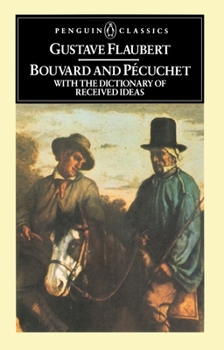Bouvard and Pecuchet: Bouvard and Pecuchet: With the Dictionary of Received Ideas
(Part of the Flaubert Series)
Select Format
Select Condition 
Book Overview
Bouvard and P cuchet are two Chaplinesque copy-clerks who meet on a park bench in Paris. Following an unexpected inheritance, they decide to give up their jobs and explore the world of ideas. In this, his last novel, unfinished on his death in 1880, Flaubert attempted to encompass his lifelong preoccupation with bourgeois stupidity and his disgust at the banalities of intellectual life in France. Into it he poured all his love of detail, his delight...
Format:Paperback
Language:English
ISBN:0140443207
ISBN13:9780140443202
Release Date:June 1976
Publisher:Penguin Adult Hc/Tr
Length:336 Pages
Weight:0.45 lbs.
Dimensions:0.7" x 5.1" x 7.9"
Customer Reviews
4 ratings
Masterpiece of Comedy
Published by Thriftbooks.com User , 16 years ago
As Flaubert aged, his books become broader comedy and this is the limit. Two petit French beurocrats, as indistinquishable as Rosencrantz and Gildenstern, take early retirement in the country and decide to study all human knowledge. In Madame Bovary, traveling libraries add to the central figure's pretension and lead to her tragic downfall. Here, simply, the older and mellower Flaubert presents endless comedy -- and while Flaubert did not finish the book, doubtless it could only continue in the same vein. Mediocrity of mind and spirit cannot be cured by simply pouring in "facts" or trivial, amateurish experience, the reader is told, by one example after the next, and never by preaching as in Tolstoy. And Bouvard and Pecuchet have no teachers -- only the audacity to assume that all worth knowing is simply open to them by the act of reading. In any event, the real end of the book was finished -- "the dictionary of accepted ideas" -- which to these uninspired clowns seems the summit of all human wisdom. Will droll, and vastly understated, the humor is only the more scathing when finally revealed, often in a scene reminiscent of Chaplin or silent comedy. Encountering this Flaubert masterpiece is greatly helped by a dead on translation that is pithy and precise, worthily replicating Flaubert's famous search for "the right word" in all his books. Even the drollest, plainest sentences resonate with humor -- never, incidentally, hateful or spiteful, but just sadly wise.
Odd but interesting book
Published by Thriftbooks.com User , 19 years ago
Flaubert supposedly read something like 1000 books to do the research for this novel and apparently had an almost photographic memory. Bouvard and Pecuchet proceed to plow through the entire corpus of human knowledge, ostensibly to become more learned and true Renaissance men, now that they are men of leisure. You'd think this would seem a laudable goal for a French intellectual like Flaubert, but he seems to be make fun of such superficial or perhaps self-educated learning, and perhaps of human knowledge in general. Flaubert seems to presage the 20th century's weariness with arid and purely ivory-tower scholarship that perhaps has led to the anti-science sentiments we see today, the rise of fuzzy-minded, muddy, and fallacious philosophies like New Age, and perhaps even movements like Creationism's antipathy toward evolution and Darwin. Perhaps to Flaubert, since there is no end to learning, and all human knowledge, or at least an individual human's learning is finite, there are no real truths and all knowledge is essentially relative and inconstant and incomplete. Certainly Bouvard and Pecuchet's projects are always doomed to failure and are never completed. I'm not sure what else in the way of profound meaning I can glean from this book, but it does seem to sound a cautionary warning or perhaps cynical note on the dangers of superficial learning or perhaps even too much learning. Perhaps Flaubert is also saying life is not something to observe and analyze, but to experience instead. That would be consistent with the beliefs of the Realists, since the French Realist authors like him pioneered the idea of intensively observing and researching the common people and the dregs of society that they often wrote about, as in Zola's Nana, for example, who was a prostitute.
Sharp satire, fuzzy edition
Published by Thriftbooks.com User , 23 years ago
Bouvard and Pecuchet is one of the funniest books ever written, and remains every bit as telling in its attack on bourgeoise society as when it was first published. The "Dictionary of Received Ideas," which is included in this edition, is sort of a "Devil's Dictionary" of middle-class stupidities; astonishingly, almost all of its satirical bite still holds true. I dock this Penguin edition one star because it doesn't have any notes, which would have made Flaubert's nineteenth-century context far more easily graspable.
Essential reading for the 80's generation-disco desperates
Published by Thriftbooks.com User , 26 years ago
Although he never finished this book, it remains even in translation, a perfect guide to the perils of bourgeois ambitions. Two hapless bank clerks use a sudden inheritance to dabble disastrously in all the current fashions, with hilarious and mordant results. Includes a "dictionary of received ideas" which should be required reading for all Americans. I read it at least once a year, out loud, and am much the better for the release. Buy it for everyone you know, and see if you can then watch Jimmy Stewart or Martha Stewart without throwing up.






